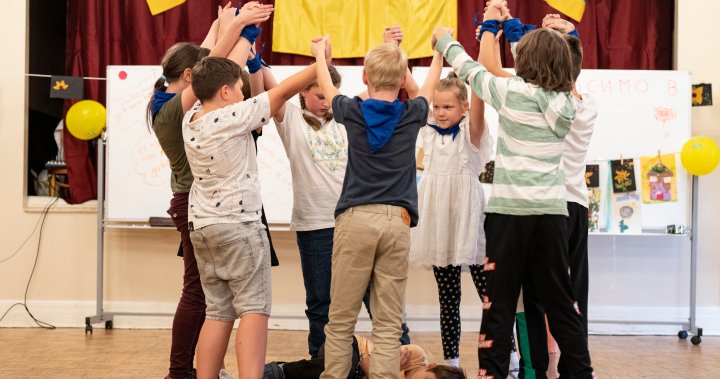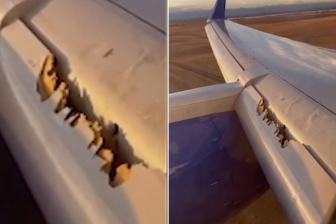Peter Schturyn counts himself lucky that family and friends in Ukraine are far from the worst of the fighting since Russia’s invasion of the country.
But he says that’s not the case for many of the Ukrainians who’ve come to Canada since then.
Saturday marks two years since Russian President Vladimir Putin’s military invaded the neighbouring country in what Putin has called a “special military operation.”
A few weeks later, on March 17, 2022, Canada launched the Canada Ukraine Authorization of Emergency Travel (CUAET) for Ukrainians fleeing the war. Between then and Jan. 27, 2024, Canada welcomed 221,231 Ukrainians to live, work and study until it is safe for them to return home.
But Schturyn, president of the Ukrainian Canadian Congress, said after two years of war, many Ukrainians may not have a home to return to.
“Their homes are no longer there. If your apartment building was blown up … what does that person do?” he said, adding few expected the war to go on as long as it has.
“That visa program will end at the end of March, so it’ll be next to impossible for anybody else trying to come into Canada under that program.”
He noted that even for those already here, learning to navigate Canada’s immigration system longer term is a challenge.
“I met a lady just this past weekend who said she’s already spent $10,000. She’s only been here a year and she’s spent over $10,000 in legal fees trying to go through the process to apply for residence,” he said.
“How do you make a plan if you have a family? The longer it goes, the more the people will be probably leaning towards staying.”

On Tuesday, Justice Minister Arif Virani announced funding of $475,788 for the Ukrainian Refugee Legal Relief Initiative run by the legal aid organization Pro Bono Ontario.
The money will go towards helping to offer more of that support to meet the growing demands for legal aid from Ukrainians in Canada as the war stretches on.
Get the latest National news.
Sent to your email, every day.
Kirsti Mathers McHenry, executive director of Pro Bono Ontario, told reporters that their hotline for Ukrainians has provided legal aid to 1,229 unique individuals in three languages – English, French and Ukrainian – since it was launched in June 2020.
They also provided more intensive services to 50 people, whose legal needs were too complicated for a helpline.
“Most of the questions we’re getting are around immigration and refugee law,” she said.
“We’re getting questions about work permits, study permits, extending your stay in Canada, arriving in Canada, supporting family members who need to come to Canada, and making refugee claims and also finding a permanent path to residency here.”
It’s a challenge Orest Romanish, a volunteer with Ukrainian Canadian Social Services in Vancouver, says he sees reflected in the uncertainty on the ground.
“Some of the people that I’ve spoken with do have that idea in the back of their mind that once things settle down … they will be returning,” he said.
“I’m not sure that that’s a majority.”

Relief organizations say as the war has gone on, there has been a greater emphasis on mental health supports for those who managed to escape the war but are living with the impacts.
“When people are consumed with their basic needs in terms of employment and housing and taking care of their family’s safety, they just don’t have the time to prioritize their mental health,” said Sarosh Rizvi, co-chair for the Ukrainian National Secretariat and Operation Ukrainian Safe Haven.
“But now that people are a little bit more stable, we’re seeing significant needs as far as mental health supports go.”
He said the technological capacity to offer virtual mental health care that emerged during the early years of the COVID-19 pandemic has helped Ukrainians connect with mental health professionals in some of Canada’s biggest cities, even if they may not live in those cities.
But Rizvi says many are also struggling with housing and affordability.
“People are really still settling in the major urban centres (such as) Toronto, Calgary and Vancouver. And affordability and housing availability so limited in those places,” Rizvi said.
“We’ve been working on trying to showcase the rest of Canada and not just to Ukrainians, but to anyone trying to come here.”
The country’s dependency on cars outside of urban areas is part of that, Romanish said, because many of the Ukrainians who’ve come in recent years don’t have them.
Then, there’s the desire for connection in the diaspora community, and a determination to hold fast to cultural traditions.
Schturyn says many Ukrainians who’ve come have been keeping their culture and community alive, even as they attempt to build a home away from home, and plan for an uncertain future.
“Last year … (some said) maybe we shouldn’t be doing this and some people cancelled,” he said about celebrations like Ukrainian holidays.
“This year, a lot of them said, ‘Look, we just can’t cancel everything. We can’t cancel all of our celebrations in our community. Because God forbid that this war goes on for five, six, seven years.’
“That’s really what Russia wants to do. It wants to break us as a people.”










